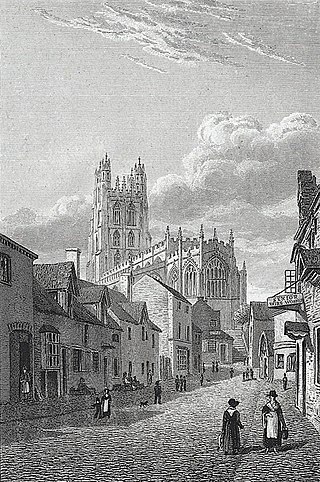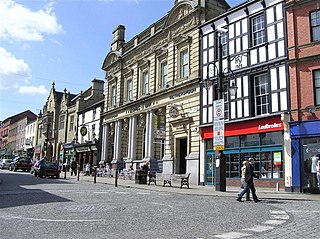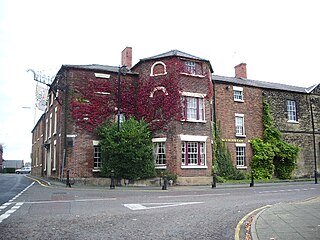
Wrexham is a city and the administrative centre of Wrexham County Borough in Wales. It is located between the Welsh mountains and the lower Dee Valley, near the border with Cheshire in England. Historically in the county of Denbighshire, and later the county of Clwyd in 1974, it has been the principal settlement of Wrexham County Borough since 1996.

Wrexham County Borough is a county borough, with city status, in the north-east of Wales. It borders the English ceremonial counties of Cheshire and Shropshire to the east and south-east respectively, Powys to the south-west, Denbighshire to the west and Flintshire to the north-west. The city of Wrexham is the administrative centre. The county borough is part of the preserved county of Clwyd.

The Diocese of Saint Asaph is a diocese of the Church in Wales in north-east Wales, named after Saint Asaph, its second bishop.

The city of Wrexham in north-east Wales has a history dating back to ancient times. The former market town was the site of heavy industry in the 19th and 20th centuries, and is now an active commercial centre. Wrexham was granted city status in 2022.

Wrexham city centre is the administrative, cultural and historic city centre of Wrexham, in North Wales and is the area enclosed by the inner ring road of the city. It is the largest shopping area in north and mid Wales, and the administrative centre of Wrexham County Borough. Many of its streets are pedestrianised.

Border Breweries (Wrexham) Ltd was a brewery in Wrexham, Wales, between 1874 and 1984.

Mansfield Brewery was a brewery and public house operating company, based in the North Nottinghamshire market town of Mansfield, England. Established in 1855, after being taken over by Wolverhampton & Dudley Breweries in 1999, the brewing of the branded beers was moved to Wolverhampton in 2002, where it continues today under the control of Marston's. The former brewery site was until 2018 still vacant awaiting redevelopment. A section previously used informally as an articulated-lorry trailer park was refused retrospective planning consent in late August 2015. Work started in 2019 to transform the brownfield site into a mixed residential development.

St James Square is a historic square in the town centre of Monmouth, Monmouthshire, Wales. It is located at the eastern end of Whitecross Street, within the medieval town walls. The area features the Monmouth War Memorial and the controversial, historic Indian Bean Tree. In addition, in 2010, the square was the site of discovery of the first Mesolithic artefacts in Monmouth. St James Square is lined with numerous listed buildings. It is also home to the Monmouth Catalpa Tree.

Porth Wen Brickworks first built by Charles E Tidy, is now a disused Victorian brickworks which produced fire bricks, made from quartzite (silica) used to line steel-making furnaces. The substantial remains include a number of buildings and the remains of some of the machinery, but has some damage from sea erosion. The site is a scheduled monument.
Sydallt is a village in Gwersyllt community, Wrexham County Borough, north Wales. It had a population of 422 as of the 2011 UK census.

Hightown is a suburban area of Wrexham, in Wrexham County Borough, Wales.

Newbridge is a village in Wrexham County Borough, Wales. The village is within the community of Cefn, to the south-east of Cefn Mawr. Newbridge is bounded to the west by the Shrewsbury–Chester railway line and the Newbridge Railway Viaduct which crosses the River Dee, which meanders to the south and east of the village. The Clwydian Range and Dee Valley AONB since 2011 borders the village to the south, as does the Wynnstay estate, and Tŷ Mawr Country Park is on the other side of the viaduct to the west.

The Wynnstay Arms is a hotel and pub in Wrexham city centre, Wales. It is located on Yorke Street and directly on the western end of Wrexham's High Street. The building is a Grade II listed building for its surviving Georgian red brick façade, while most of the building was demolished and rebuilt in the 1970s.

The Talbot is a former pub and hotel in Wrexham city centre, North Wales. It was built and opened by 1905 replacing an older inn also known as The Talbot or the Talbot Inn.

The Nags Head is a historic pub on Mount Street in Wrexham city centre, North Wales. The current frontage dates to a 19th-century remodelling under the Soames family.

Island Green is a historic brewing site in Wrexham city centre, North Wales, home to the former site of the Island Green Brewery. Following the closure of the brewery in 1931, and the abandonment of the site in the 1970s, the area was converted into a retail park in 1999, containing Wrexham Central railway station, as well as residences which utilised the former brewery buildings.

The Wynnstay Arms is a hotel and public house in Ruabon, Wales. The Grade II listed building dates from the 18th-century and was a coaching inn. Meetings of the Football Association of Wales were held in the hotel in the 19th century shortly after the organisation was founded in the Wynnstay Arms Hotel, Wrexham.

The Wrexham Police Station was a police station housed in a tall brutalist building, located on Bodhyfryd in Wrexham, Wales. Constructed in 1973 and demolished in 2020, the tower was the tallest building in Wrexham, overtaking St Giles' Church. The building served as a North Wales Police divisional headquarters and Wrexham's police station.

Salisbury Park is a conservation area in Wrexham, North Wales. Located to the south of Wrexham city centre, it is centred on Salisbury Road and Chapel Street, as well as other adjacent streets. It contains multiple listed buildings.

College Street is a street in Wrexham city centre, North Wales. It contains the Grade II listed Cambrian Vaults and The Commercial Public House, as well as the historic home of Wrexham's first brewery.






















